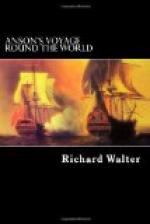The city of Macao is a Portuguese settlement situated in an island at the mouth of the river of Canton. It was formerly a very rich and populous city, and capable of defending itself against the power of the adjacent Chinese governors, but at present it is much fallen from its ancient splendour; for though it is inhabited by the Portuguese and has a governor nominated by the King of Portugal, yet it subsists merely by the sufferance of the Chinese, who can starve the place and dispossess the Portuguese whenever they please. This obliges the Governor of Macao to behave with great circumspection, and carefully to avoid every circumstance that may give offence to the Chinese. The river of Canton, at the mouth of which this city lies, is the only Chinese port frequented by European ships, and this river is indeed a more commodious harbour on many accounts than Macao. But the peculiar customs of the Chinese, only adapted to the entertainment of trading ships, and the apprehensions of the Commodore lest he should embroil the East India Company with the Regency of Canton if he should insist on being treated upon a different footing than the merchant men, made him resolve to go first to Macao before he ventured into the port of Canton. Indeed, had not this reason prevailed with him, he himself had nothing to fear, for it is certain that he might have entered the port of Canton, and might have continued there as long as he pleased, and afterwards have left it again, although the whole power of the Chinese Empire had been brought together to oppose him.
The Commodore, not to depart from his usual prudence, no sooner came to an anchor in Macao road than he despatched an officer with his compliments to the Portuguese Governor of Macao, requesting His Excellency by the same officer to advise him in what manner it would be proper to act to avoid offending the Chinese, which, as there were four of our ships in their power at Canton, was a matter worthy of attention. The difficulty which the Commodore principally apprehended related to the duty usually paid by all ships in the river of Canton, according to their tonnage. For as men-of-war are exempted in every foreign harbour from all manner of port charges, the Commodore thought it would be derogatory to the honour of his country to submit to this duty in China; and therefore he desired the advice of the Governor of Macao, who, being a European, could not be ignorant of the privileges claimed by a British man-of-war, and consequently might be expected to give us the best lights for avoiding this perplexity. Our boat returned in the evening with two officers sent by the Governor, who informed the Commodore that it was the Governor’s opinion that if the Centurion ventured into the river of Canton, the duty would certainly be demanded; and therefore, if the Commodore approved of it, he would send him a pilot who should conduct us into another safe harbour, called the Typa, which was every way commodious for careening the ship (an operation which we were resolved to begin upon as soon as possible), and where the above-mentioned duty would in all probability be never asked for.




